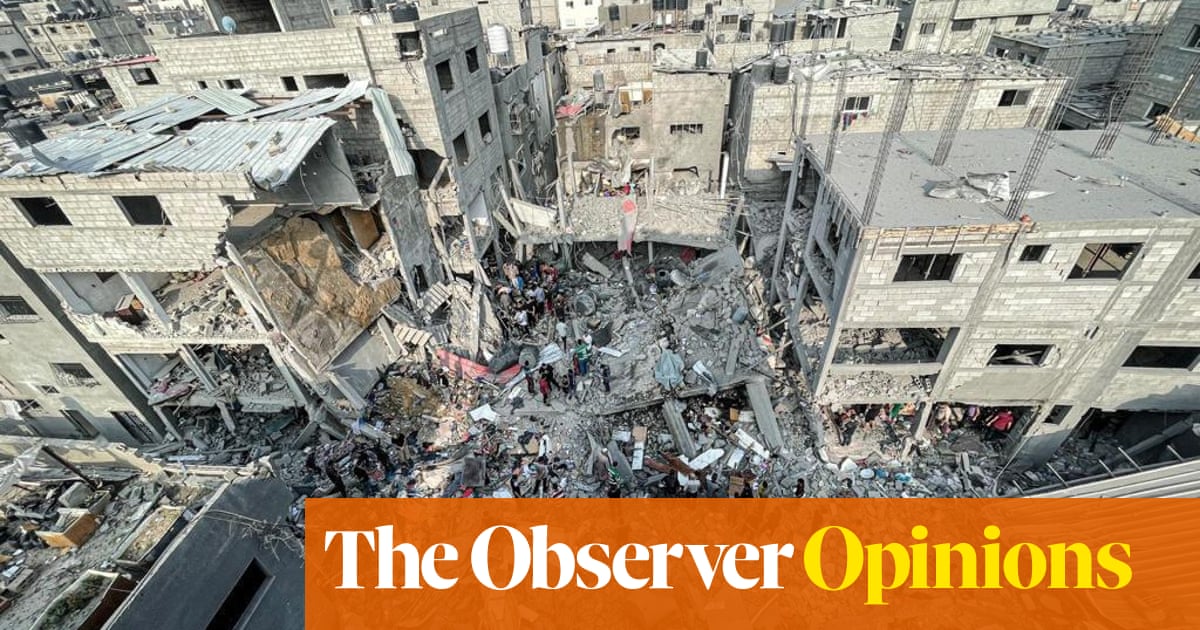
Ronen Bar, who heads Shin Bet, Israel’s internal security service, is regarded as a level-headed official and not one inclined to hyperbole: Therefore, his warning of the deteriorating situation in the West Bank must be taken seriously.
To be sure, attributing the current outbreak of attacks by Palestinian militants on Israeli targets to the weakening of the Palestinian Authority and the fading influence of Palestinian President Mahmoud Abbas holds some water. However, perhaps because he tries to avoid entering the political minefield, or because he suffers from the same eclipse of reality that too many Israelis, especially those in position of power, have been suffering from, his portrayal of the situation tells only one side of the story.
It ignores the bigger picture of Israel’s contribution to the despair among Palestinians and the loss of legitimacy of the Palestinian Authority, and the fact that the wish for security is not one-sided and should not be treated like a public good enjoyed exclusively by Israelis, while Palestinians live in insecurity.
There is something between naivety and sheer Israeli chutzpah in expecting — demanding, in fact — that the Palestinian Authority stop militancy against Israel in the absence of any political horizon, and when so many Palestinians are being killed by Israeli security forces every single month. This is not about Ronen Bar — he did not create the situation, although he is playing a central role in perpetuating it. At the end of the day, each of his predecessors knew that all they could do during their time in the service was to stick a bandaid on a heavily bleeding wound. As a matter of fact, even this is inaccurate; they might have saved the lives of many Israelis, but at a heavy price to the Palestinians, which is immoral and in the long-term compromises the chances of peaceful coexistence.
By their cooperation, the Israeli and Palestinian security forces have successfully prevented many terrorist attacks, but the window for political solutions is now all but closed, and the occupation is entrenched, stimulating resentment among Palestinians against both Israel and the Palestinian Authority, and it is this which is making a major contribution to the current escalation of violence.
Israel should not be surprised that security cooperation is being carried out with increasing reluctance, and is seen by most Palestinians as simply collaboration with the occupying forces. Such cooperation had its own logic back in the hopeful Oslo days, as a confidence-building measure aimed at containing those who would resort to violence in opposing the nascent peace process, one based on a two-state solution that should have long ago ended the occupation, provided security for everyone between the Jordan River and the Mediterranean Sea, and offered a just and fair solution the Palestinian refugee issue.
As long as the oppressive occupation continues, to expect that no Palestinians will resort to militancy is a view bordering on the delusional.
Yossi Mekelberg
Thirty years later nothing of this dream has survived, and while Israelis, thanks to decades of security cooperation with the Palestinian Authority, have enjoyed improved security, in this year alone so far 81 Palestinians, among them 15 minors, have been killed in the West Bank in incidents involving the Israeli security forces, and this is in addition to the 49 deaths in Gaza. It has led Washington, which does not often rebuke Israel and particularly not in public, to make it known that it is pressing Israel to closely review its open-fire rules and to take steps to mitigate the risk of harming civilians.
The writing has been on the wall — figuratively and literally — for a very long time. A combination of the daily misery of living under occupation, a Palestinian Authority which is dysfunctional and to a large extent on hold until the inevitable succession issue is resolved, and the lack of a political solution in the offing, can only be a recipe for increased militancy, even though such actions are carried out by only a tiny minority. This conflict has seen too much human loss and suffering, and should and could have been resolved a long time ago. Neither side is free of blame, but as long as the oppressive occupation continues, settler violence increases, and settlement expansion goes unabated, to expect that no Palestinians will resort to militancy is a view bordering on the delusional.
This tragic situation is exactly what militancy and terrorism thrive on, and furthermore, as surveys among Palestinians demonstrate, such a response increasingly enjoys public support, as people long for either someone to break the impasse or stand up to those who are inflicting such extreme misery and humiliation on them, while support for a diplomatic solution to the conflict fades away.
Without injecting a new lease of life into a political initiative which would first improve the daily lives of Palestinians and treat them with the dignity and humanity they deserve, and then to introduce a vision of a political solution, the likelihood of violence becomes an inescapable reality. But instead, Israel is attempting to reverse the causality of events to justify its idée fixe (fixed idea) that there is no partner for peace, and by that excuse, to continue the occupation in perpetuity.
A further contribution to the current diplomatic impasse that is holding the door open for militancy is the volatility of the Israeli political system and the rise of the right, including the Kahanists’ ultra-right, messianic elements that are predicted to do well in November’s general election. This has not escaped the attention of Palestinians and is a cause of both fear and anger. A grouping that was once seen as an abhorrent phenomenon on the very fringe of Israeli society and politics, one calling for the expulsion of Palestinians from the West Bank and the annexing of all of its territory, is now spoken of as a legitimate partner in a coalition government.
Legitimizing the biggest Palestinian haters in Israeli society and not containing settler violence has become a significant factor in today’s dangerously explosive situation in the West Bank. The current paradigm of Israeli security in its relations with the Palestinians is outdated, short-sighted, immoral and in many cases illegal in the eyes of international law, and hence unsustainable, and can only lead to yet more violence and bloodshed.
Yossi Mekelberg is professor of international relations and an associate fellow of the MENA Program at Chatham House. He is a regular contributor to the international written and electronic media. Twitter: @YMekelberg












